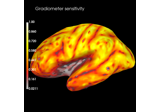mne.source_space.compute_distance_to_sensors#
- mne.source_space.compute_distance_to_sensors(src, info, picks=None, trans=None, verbose=None)[source]#
Compute distances between vertices and sensors.
- Parameters:
- srcinstance of
SourceSpaces The object with vertex positions for which to compute distances to sensors.
- info
mne.Info|None The
mne.Infoobject with information about the sensors and methods of measurement. Must contain sensor positions to which distances shall be computed.- picks
str| array_like |slice|None Channels to include. Slices and lists of integers will be interpreted as channel indices. In lists, channel type strings (e.g.,
['meg', 'eeg']) will pick channels of those types, channel name strings (e.g.,['MEG0111', 'MEG2623']will pick the given channels. Can also be the string values “all” to pick all channels, or “data” to pick data channels. None (default) will pick good data channels. Note that channels ininfo['bads']will be included if their names or indices are explicitly provided.- trans
str|dict| instance ofTransform If str, the path to the head<->MRI transform
*-trans.fiffile produced during coregistration. Can also be'fsaverage'to use the built-in fsaverage transformation.- verbose
bool|str|int|None Control verbosity of the logging output. If
None, use the default verbosity level. See the logging documentation andmne.verbose()for details. Should only be passed as a keyword argument.
- srcinstance of
- Returns:
- depth
arrayof shape (n_vertices, n_channels) The Euclidean distances of source space vertices with respect to sensors.
- depth
